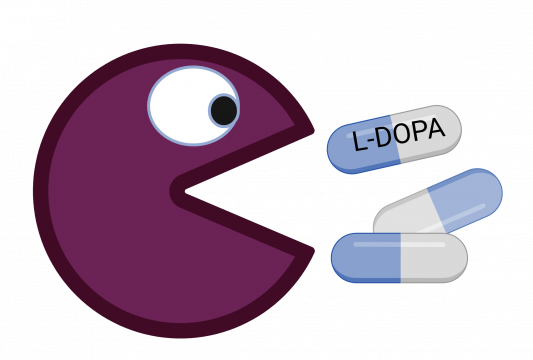A better levodopa

Saku Renunanen's manuscript about novel inhibitors of levodopa decarboxylases was published in the European Journal of Pharmaceutical Sciences. It is a textbook example of drawing from the expertise of many different people to make progress. We all know that levodopa provides only symptomatic treatment and that the real breakthrough in Parkinson's Disease treatment probably has to come from a molecular understanding of the formation of the alpha synuclein and tau protein aggregates and how to interfere with or reverse it. However, disentangling the molecular aetiology of Parkinson's disease and finding a way to interfere with it will still take us many years. Therefore, improving existing treatment strategies can have a bigger impact on patients' lives in the short term, and exploring new approaches to improve dopamine deficiency-addressing strategies is thus worthwhile.
Levodopa is still the go-to drug for Parkinson’s disease, but a lot of it gets broken down before it ever reaches the brain. While we already use drugs like carbidopa (Lodosyn) to help prevent this, recent research suggests that gut bacteria may also be contributing to the issue. Specifically, Enterococcus faecalis and similar bacteria can interfere with their tyrosine decarboxylase enzymes.
To address this, in this paper, over 150,000 compounds were screened computationally looking for ones that could block this bacterial enzyme. After a series of in silico and lab tests, three promising compounds were selected that can inhibit both the bacterial TyrDC and human AADC (the enzyme is already targeted in patients).
Why does this matter? These compounds could lead to more effective symptomatic treatments for Parkinson’s Disease. Due to differences in the gut microbiome, some patients might benefit more than others, notably those with high levels of levodopa-hungry gut bacteria. Check out the full study here: https://doi.org/10.1016/j.ejps.2025.107133. I always learn a lot of new, super-interesting things in these types of collaborations. Which is one of the reasons why I chose to do science for a living in the first place.



